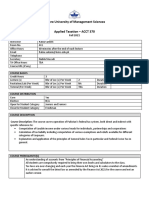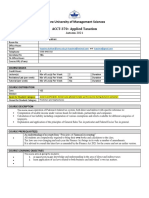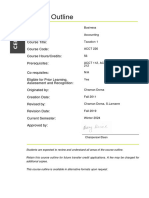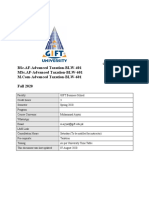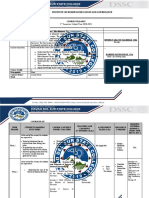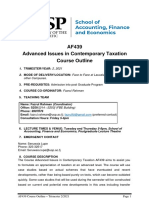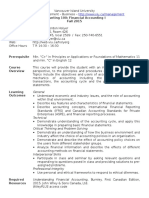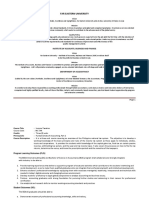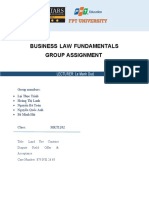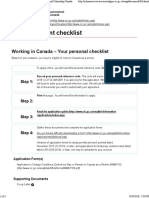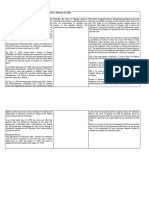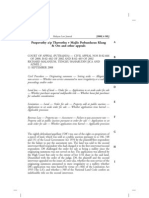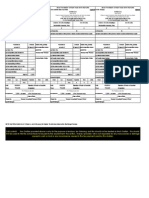18-Apr-25
COURSE OUTLINE
For
Advance Taxation
Muhammad Ayyaz
ACMA, ACPA
Email: m.ayyaz@gift.edu.pk
whatsApp # 0321-5079006
COURSE OBJECTIVES
By the end of the course, students will be able to
understand theoretical framework and practical
application of:
Income tax laws in Pakistan
Computation of taxable income and tax liability
of AOP and companies
Sales Tax Laws in Pakistan
1
� 18-Apr-25
Course Outcomes
Expected cognitive outcomes include the development and
demonstration of a high level of skills in:
Understanding of Pakistan tax system through the study of more
advance topics.
Identify and evaluate the impact of relevant taxes on various
situations and course of action, including the interaction of
taxes.
Provide advice on minimising and/or deferring tax liabilities by
the use of standard tax planning measures.
Communicate with clients and other professionals in an appropriate
manner.
Ability to assume responsibility and make decisions
Reading Material
Mr. Khalid Petiwala’s Notes on Advanced Taxation for
tax year 2022.
EXTRA READING MATERIAL
Synopsis of Taxation in Pakistan by Mirza Munawar
Hussain for tax year 2025.
Tax Laws in Pakistan by Huzaima and Ikram for tax year
2025.
2
� 18-Apr-25
Course Outline 1/10
Assets & Depreciation - 02 Sessions
Types of assets under income tax law
Acquisition of an asset
Cost of an assets
Disposal of an asset
Rates of depreciation allowance
Computation of Depreciation allowance
Amortization of intangibles
Course Outline 2/10
Method of accounting and accounting records - 01 Session
Method of accounting prescribed by income tax law
Income from long term contracts
Records to be kept by business taxpayer
Records to be kept by non-business taxpayer
3
� 18-Apr-25
Course Outline 3/10
Payment of tax - 02 Sessions
Deduction of tax at source
Statement to be filed with income tax department
for tax deduced at source
Advance payment of tax
Payment of tax with return
Tax on demand, recovery of tax, and
Refund of tax.
Course Outline 4/10
Tax Credits - 01 Session
Categories of tax credits
Priority of tax credits
Taxation of Association of Person - 03 Sessions
Taxation of professional firms
Taxation of AOP other than professional firm
Losses of AOP
Discontinuation of business or dissolution of AOP.
4
� 18-Apr-25
Course Outline 5/10
Taxation of companies - 05 Sessions
Principles of taxation of companies
taxation of different types of companies and matters
relating thereto
Minimum tax.
MID TERM
5
� 18-Apr-25
Course Outline 6/10
Filing of return of total income of AOP and companies - 02 Sessions
Date of filing of return
Period of return
Extension in the filing period
Method of furnishing return
Revised return of total income
Course Outline 7/10
Set Off and Carry Forward of Losses - 02 Sessions
Losses from a source of income.
Set off losses.
Carry forward of losses from business.
Carry forward of losses from banking company.
Speculation business.
Capital Losses.
Losses in AOP and certain companies
6
� 18-Apr-25
Course Outline 8/10
Assessment procedures - 02 Sessions
Return of income as assessment
Self-assessment scheme
Best judgment assessment
Provisional assessment
Amended assessment
Limitation for assessment, rectification of
mistakes.
Course Outline 9/10
Income tax authorities - 02 Sessions
Appointment
Control
Jurisdiction
Powers
Appeals and revisions - 01 Session
Appeal to commissioner of Income Tax (appeal)
Income Tax Appellate Tribunal
High Court and Supreme Court
Appeal procedures
Burden of proof
Authorized representative
Computation of limitation period.
7
� 18-Apr-25
Course Outline 10/10
Sales Tax – 06 Sessions
Return of sales tax
Scope and payment of tax
Appeals
Refund and recoveries
Assessment
Item Assessment Task Frequency Weighting
1. Class Participation 15 15%
2. Assignments 6 15%
3. Quizzes 6 15%
4. Mid term examination 3 hours 15%
5. Final Examination 3 hours 40%
Students must complete each component of the assessment to the satisfaction of
the course instructor, and achieve an overall mark of at least 50% in order to pass
the course. All components of the above assessment are compulsory, and must be
completed in order to obtain a pass grade. Students are expected to perform
satisfactorily in each item.
8
� 18-Apr-25
General Requirements
Enrolment in this course is undertaken on the basis that prior assumed knowledge has been
gained by the attainment of a grade of “pass” or above in the prerequisite course/s (if
applicable). Failure to adhere to this recommendation may result in you having difficulty with
the course and not being able to successfully complete it. Any additional support or special
assistance cannot be expected or requested if you have not completed the recommended
prerequisite course/s.
To be eligible to pass GBS courses, students must demonstrate a reasonable degree of
competence in the required course objectives as examined in each form of assessment.
Non-submission of a piece of assessment will incur a failure grade for the GBS courses.
Students are expected to spend time outside of supervised class periods developing skills and
knowledge.
General Requirements
Any dishonest assignment will be penalized.
Dishonest assignment includes:
Deliberate copying or attempting to copy the work of other students;
Use of or attempting to use information prohibited from use in that form of assessment;
Submitting the work of another person as your own;
Plagiarism (i.e. taking and using the thoughts and writings of another person with the intent
to claim the work as your own);
Any student found knowingly to have helped another student to produce an assignment
dishonestly will incur the same penalty as awarded to that student.
Full and detailed acknowledgement must be provided if contributions are drawn from the
literature in preparation of reports and assignments.
